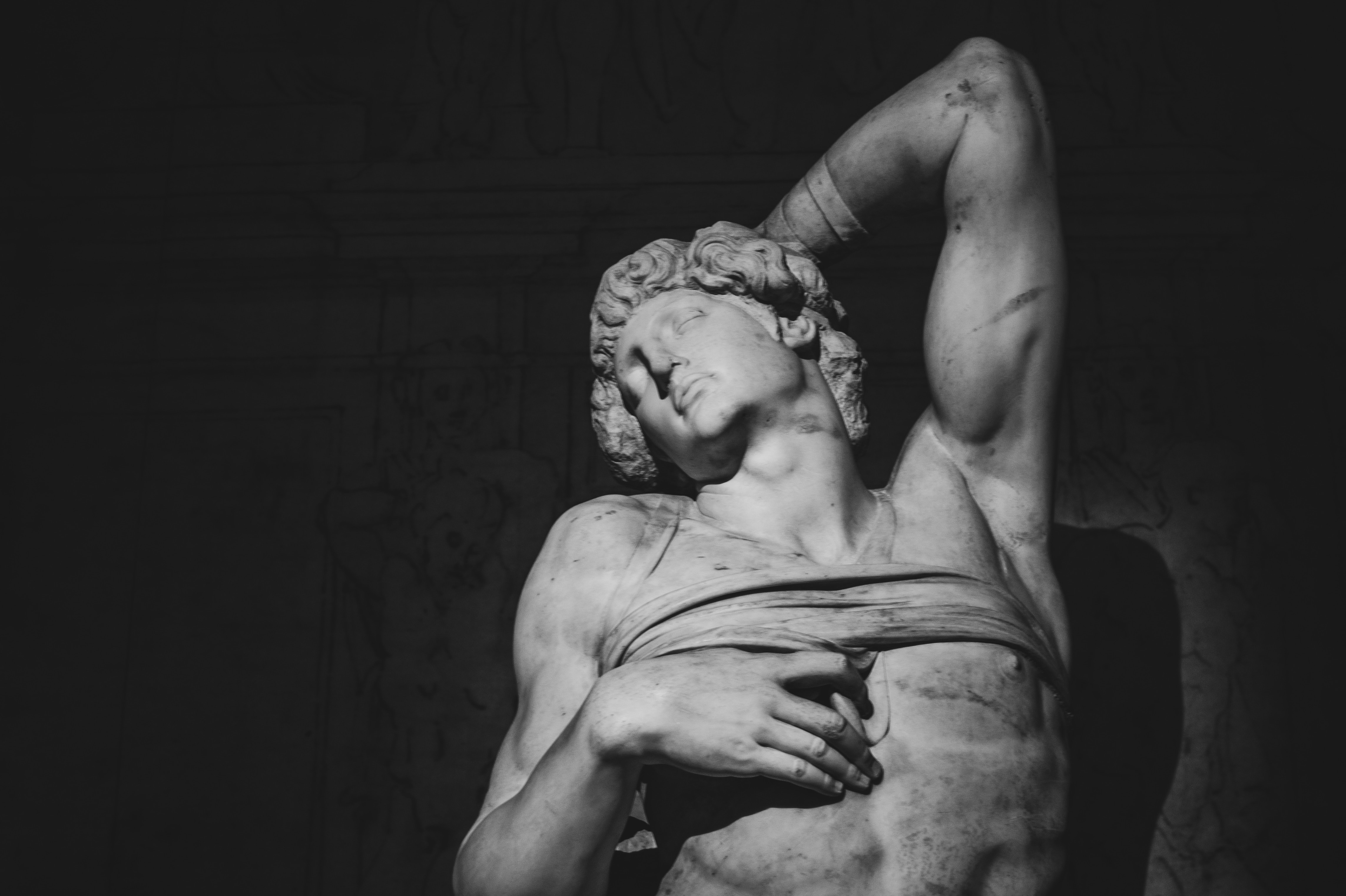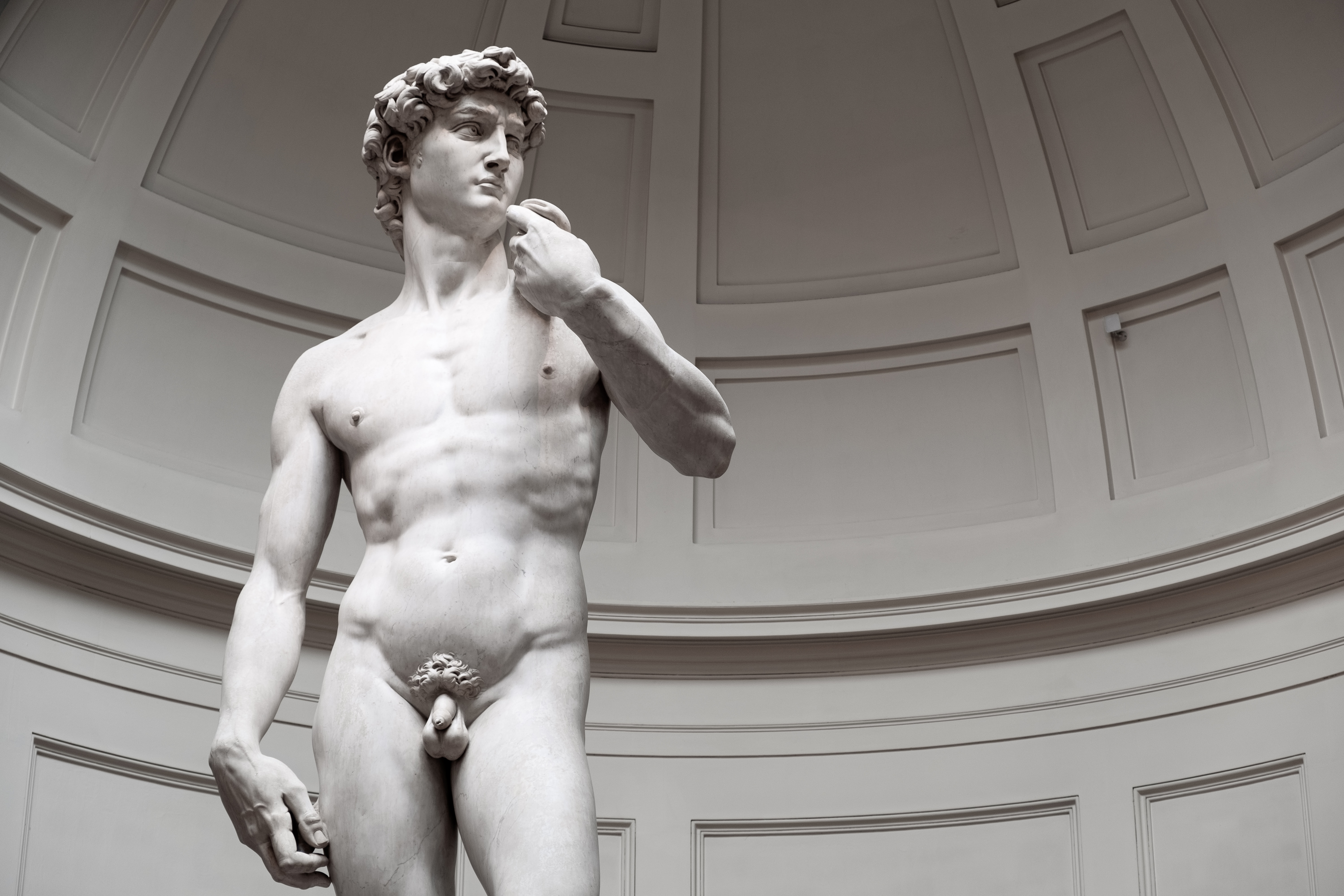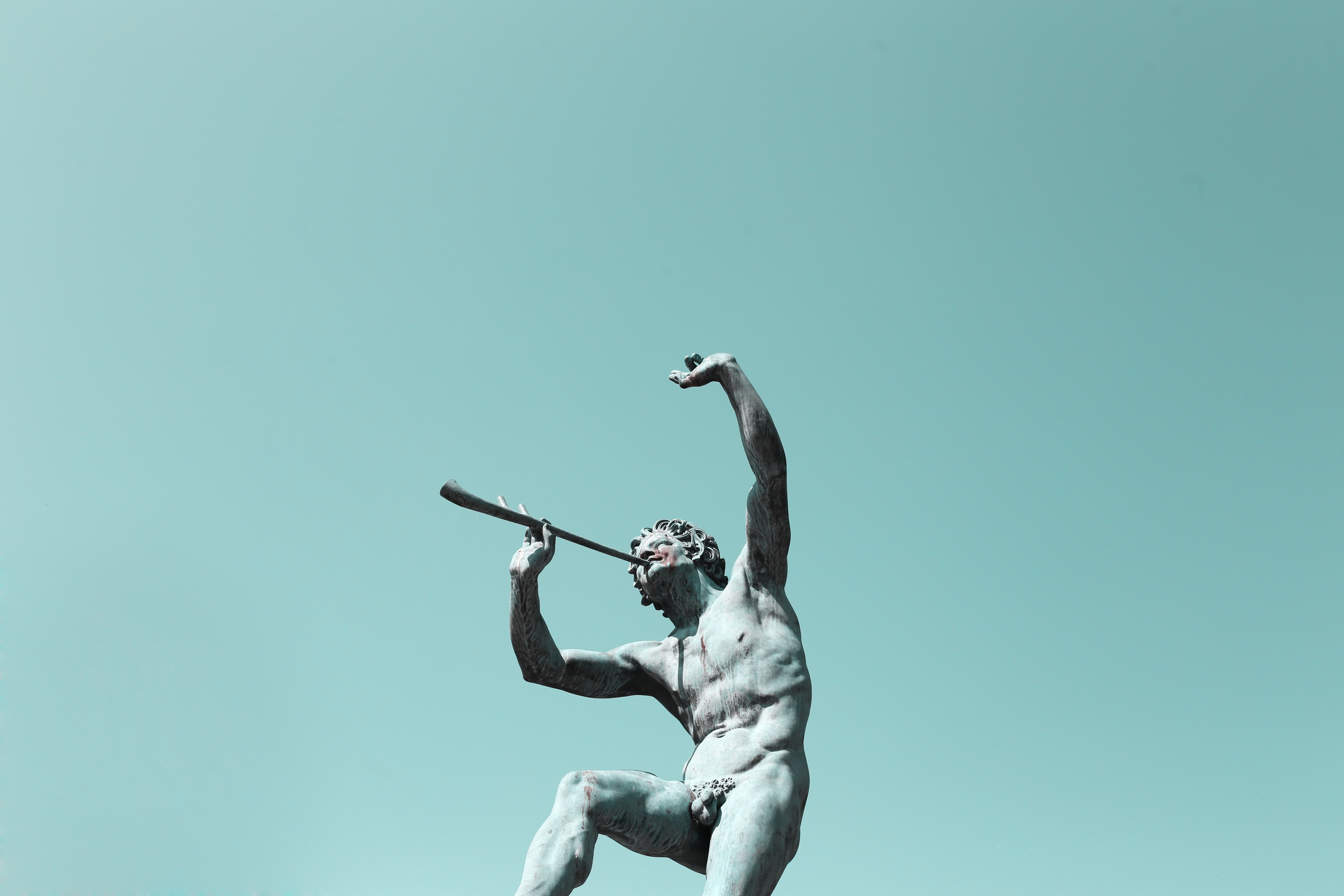Rey Conquer
Queer Virtue
A review of Huw Lemmey and Ben Miller, Bad Gays: A Homosexual History (Verso, 2022) and Ludwig Wittgenstein, Private Notebooks: 1914-1916, ed. and trans. by Marjorie Perloff (Norton, 2022).
Queerness, previously a specific vice, has become a general virtue. Not only is it ‘good to be gay’; to be good is to be gay, and to be gay is to be good. This comes in different forms. ‘Queer’ has become a term of approval, used to bless aesthetic and political attitudes that no longer have a direct connection to homosexual desire. Promising a radical and uncompromising resistance to the moral norms of straight society, ‘queer’ has become emptied of everything but the form of the gesture. Queerness has come to stand for noble suffering, a heroic narrative of self-actualisation and psychological hygiene: the self-mastering individual who can name their desires. And to support the queers is to show oneself on the side of the good, and so we arrive at everything that falls under the terms ‘corporate pride’ and ‘pinkwashing’, from the comical to the grotesque: from the gay burger with two tops and two bottoms to the rainbow bullets in a US marine helmet.
Where once we struggled to show that gays could be good, we now struggle to imagine we could not be. It is from this automatic association of goodness and gayness that Bad Gays (Verso, 2022) by Huw Lemmey and Ben Miller, a book based on a popular podcast of the same name, seeks to liberate us. Bad Gays – ‘a podcast about evil and complicated queers in history’ – asks why ‘we remember our queer heroes better than we remember our queer villains’ – and why ‘it is sometimes so hard to tell the difference’. Gay is good, they write, ‘but it is no good at all on its own’. In their book they argue for the abandonment of ‘gay’ altogether as an identity, or at least homosexual desire as a rallying point for a political project. Telling the history of gayness and power through a series of biographical chapters on figures from Hadrian to the Dutch politician Pim Fortuyn, they conclude that the goodness of a gay movement, or gay individual, comes not as an innate or spontaneous feature – their figures are, after all, mostly kings and emperors, politicians, ‘elite’ – but from the degree to which one is committed to emancipation more broadly. It is not gayness itself that confers goodness, only whether one is on the side of the dispossessed.
Lemmey and Miller quote Gary Indiana in their epigraph: ‘since the homosexual is continually taught by the world around him that his natural home is the sewer, the homosexual is uniquely equipped to discover what truly belongs and doesn’t belong in the sewer’. Where Indiana is suggesting that homosexuals are more likely to be able to have a clear and unhysterical view of other moral panics, here, in a camp twist, his words are made to suggest that homosexuals are best placed to consign fascism, racism and imperialism to the sewer. Homosexuals, that is, are not just in a certain way epistemically privileged – granted a clearer view of the way things are, less susceptible to the political appropriation of the moral – but are in a better position to stand in moral judgment of the political. Although they encourage us to acknowledge ‘complication’, the book is gleefully judgmental – ‘deliciously’ so, as one review describes it. This is not, then, a book freeing gays from having to be good: it is asking them to do better.
Lemmey is a writer of experimental novels and cultural criticism, known through Twitter for his moral clarity on what Tom Driberg, one of his heroes, called ‘deviant sex… and left-wing politics’. Lemmey’s solo writing distinguishes itself in its combination of subtlety and straightforwardness and in his avoidance of pretension and the fashionable idea for its own sake. His language is effective and unforced, and he never strays far from what the poet Donald Davie called the ‘reek of the human’. All of this sits at times uneasily with the academic hygiene of his co-host Miller, a PhD student, a tension on the level both of style and of underlying conception of the value of the human in the project as a whole: are queers moral agents or vectors of impersonal forces? Are the stories of individuals there as a decoy or as a way of bringing ourselves into relation with each other and the past?
In a certain way Bad Gays is an Eminent Victorians for the twenty-first century, taking down the celebratory approach of a previous generation, revelling in revisionist objectivity, the biographer’s new role of ‘lay[ing] bare the facts of the case, as he understands them’; but in its revolt against a twentieth-century elite gay identity, which Strachey himself has come to represent, it reverts to what Strachey saw as the sins of the two-volume Victorian biography, their ‘ill-digested masses of material, their slipshod style, their tone of tedious panegyric’ – replaced here by condemnation – ‘their lamentable lack of selection, of detachment, of design.’ Gossip, sassy asides, jokes about ‘size queens’ are dropped in as lubrication for pure information, and the usual features of the podcast as a genre or form – banter, back and forth, a performance of genuine human connection – are disregarded in favour of content, its own kind of moral programme.
 Photo by Jean-Baptiste D. on Unsplash.
Photo by Jean-Baptiste D. on Unsplash.***
Why do we remember our queer heroes better than we remember our queer villains? Earlier projects of historical revisionism sought both to identify and rehabilitate historical figures, finding in historical homosexuality not only something that has always been there, but also something that has not always been bad. It can be a process of asserting the sexuality of already important figures, showing that we were always at the centre of it all. It can be a process of rescuing figures who have been unfairly forgotten, or getting justice for those unfairly persecuted. This increasingly serves the needs not of queers but of straight society: acceptance reflects back on the accepter, allows them to be able to see themselves as good, as ‘allies’. A part of this is a severing of the actions of these figures from their sexuality: these are people who were good and just happened to be gay, a model deriving from the assimilationist branch of gay activism based on conforming to the delineations of bourgeois society in all but one aspect, queerness relevant to one’s sense of self but not to one’s sense of belonging. The model of the ‘good gay’ Lemmey and Miller are working with, by contrast, understands the goodness of queer heroes to be motivated by their – inalienable – gayness: less queer heroes than queer saints, with an authentic, spontaneous and unashamed queerness as an analogue for closeness to God, free sexual expression the unblocked flow of a kind of grace.
The initial impulse to invert received ideas of morality – asserting that it is not vicious or shameful to arrange one’s life outside of heterosexual marriage – ends up requiring conformity to other popular virtues, and this goes just as much for a radical or grassroots project, where the virtues are political. What Bad Gays tries to show is that the idea that historical queers will be ‘good’ according to the values of our time is a nonsense. It is precisely their subjects’ gayness, the authors claim, that influenced their badness. At the same time the joke of the title – in that one might call oneself a ‘bad gay’ for deviating from community norms: brunch, Cher, going out – asks whether to be ‘bad’ is to be bad at being gay, that is, a betrayal of the community.
In so doing it shows up the emptiness of a resistance to virtue per se, the trope by which the bad is celebrated for its very badness – the idea, for example, that queer sexual practices are enjoyable because they are sinful, that to be ‘good’ is to be boring. Lemmey and Miller celebrate ‘bad’ sexual behaviour – cruising, open relationships, BDSM. But at the points where this behaviour unambiguously involves dehumanising the others involved – the racialised notes that Roger Casement or John Maynard Keynes made about their sexual partners, the allegations of sexual harassment made against Franco Zeffirelli – they make their judgment clear. Lemmey has an essay in praise of meaningless sex, which argues, essentially, that even the most casual sex can be meaningful; and in their episode on Francis Bacon, it is ultimately virtues of an everyday, indeed quasi-Christian, sort, enabled by his practices of self-abasement, that come to the fore: enormous material generosity, a deep and non-judgmental openness to others.
Bad Gays is at its best in the moments when the figures it treats escape judgment through the sheer compellingness of their character, such as Ronnie Kray and, in particular, Yukio Mishima. If we react with horror it is not because we feel we ought, but through a sense of having been confronted with a fellow human, however violently misguided, however far their life may be from the values we prize, and having taken them seriously as fellow humans. And this is surely our aim. The liberation of sexual orientation from any framework of vice or pathology frees us to be fully human: to be bad, and to worry about our badness, without it being excused by, or understood as a symptom of, our sexuality; to make mistakes, to pursue goodness, to be forgiven, to be sad, vain, hopeful, to learn better ways of loving, and so on.
 Photo by Steve Barker on Unsplash.
Photo by Steve Barker on Unsplash.***
‘I hope’ – said George Steiner to the philosopher Ray Monk – ‘you are going to show the connections between Wittgenstein’s violent homo-eroticism and the Private Language Argument.’ Monk’s eventual biography, published in 1990, did no such thing; indeed it made clear that Wittgenstein’s ‘homo-eroticism’ was of a primarily emotional and not bodily kind, violent only in the vehemence with which he could respond to being asked to accommodate another and in the intensity of his moral self-flagellation. (Monk explains that what Steiner meant by violent homo-eroticism involved a comical misunderstanding of gay codes: in a photo of Wittgenstein and his boyfriend Ben Richards, a doctor, Richards is wearing a leather coat: ‘rough trade’, in Steiner’s eyes.) Monk’s biography can be understood as a kind of hagiography – a modern vita, that is, depicting Wittgenstein as a philosopher saint whose life was committed to the integration of moral, aesthetic and intellectual purity and truth to the self, whose hardness and ill temper and impatience sprang from a hatred of insincerity and humbug. He takes Wittgenstein at his word when he sees no connection between his homosexuality and his philosophy, whether in content or as a form of escape. In his appendix Monk patiently examines the claim made by another biographer that Wittgenstein had cruised the Prater for rough trade when a trainee teacher in Vienna and comes to the conclusion that Wittgenstein ‘was uneasy, not about homosexuality, but about sexuality itself. … Sexual arousal, both homo- and heterosexual, troubled him enormously. He seemed to regard it as incompatible with the sort of person he wanted to be’.
For Marjorie Perloff, in this new, English, edition of Wittgenstein’s personal notebooks from the first world war, this is a form of homophobia. ‘Somehow, even Monk, who seems to understand Wittgenstein so perfectly, cannot reconcile himself to his subject’s queerness.’ Her project is to show the interrelation between the life and the work in the years 1914–1916. Her book includes translations of all of the personal remarks made, in a simple code, as a kind of diary on the left-hand pages of the notebooks; on the right-hand pages he did his philosophical work, some of which she also includes. She sees several connections: the first is an alteration in spiritual outlook in 1916, when he was at the front, the ideas from which changed the direction of the Tractatus; another is the importance of his Austrianness for Wittgenstein, often seen only as a British philosopher; and a third is his desire for men, which is understood here as a cause of torment. Where Monk and others have depicted him as a philosopher saint, Perloff’s Wittgenstein is a gay martyr. This is one of the central lines in the introductions and afterword, and also influences the translation. (For instance, she reads Wittgenstein’s visits to the baths as cruising, and so ‘Abends gebadet’, ‘in the evening, bathed’ becomes the accurate but in context ambiguous, ‘in the evening, went to the baths’.)
But to read the personal notes of 1914–16 is to get the impression that any torment is not to do with sex, but to do with goodness more generally, his ‘moral standing’. Perloff imagines this phrase to refer to ‘some sexual affair’, but in keeping with the rest of the notes it could refer rather to the state of his soul: ‘I am a worm’, he writes in 1916, ‘but through God I can become a man.’ He had signed up as a volunteer but found the company of his fellow soldiers intolerable. Early in the war he remarks, ‘so it turns out not to be true that a great common cause inevitably ennobles people’. He uses moral vocabulary for class distinctions, finding officers more ‘decent’, the enlisted men a ‘pack of rogues’ full of ‘stupidity, insolence and malice’ from whom he feared a kind of moral contagion. His philosophical work, too, is understood in such terms: work is a ‘grace’; ‘just keep working so that you become good’.
The war itself is treated as a moral ‘test of fire’, and the aim is not to lose the self, nor to lose control of oneself in the presence of others. His self-reproach at his anger at the men derives less from his not having been kind to them so much as his lack of self-control, his inability to practise detachment around them. He admires but cannot emulate the first lieutenant who manages to see the human in even the ‘worst rascals’ without losing something of his own dignity. Those he loves and considers peers are a source of great encouragement, and great anxiety. A businesslike letter from John Maynard Keynes distresses him by its tone; he is anxious to meet the poet Georg Trakl, only to find out that he had died a few days ago: ‘How sad, how sad!!!’. Of references to his friends from Cambridge, most frequent of all are to his friend David Pinsent, a maths student, shown in Monk’s biography to be far less attached to Wittgenstein than Wittgenstein to him. ‘A letter from David!! I kissed it. Answered right away.’ ‘When will I receive news from David?!’ ‘Thinking a lot about David. Will I ever see him again?’ (He did not. Pinsent died in an accident in 1918; to Pinsent’s mother Wittgenstein wrote that Pinsent had been ‘my first and only friend’.) The notes jump quickly from one part of Wittgenstein’s life to another, telegraphic records of work and masturbation and duties and frustration at his moral limitations – and the reader too may begin to feel frustrated at his obsessive self-reproach. But in their immediacy – with all their vigorous dashes and underlinings and exclamation marks, the great sense of importance given to even the smallest slights or acts of kindness, the emphasis, even if misplaced, on wanting to lead a better life – they are also intensely moving.
Of twentieth-century anglophone philosophers, none can have attracted so much biographical attention as Wittgenstein. Why do we care so greatly about what sort of person he was, and desire to retell these stories of his life and character? (According to Fania Pascal, who taught him Russian, Wittgenstein himself often suggested that ‘what we would like to pass for interest in other people is first and foremost malice’.) To Perloff, he was a man of contradictions, ‘as mysterious… as a character in a Dostoyevsky novel’. But for others the appeal was his consistency and integrity. He offers a model, if not of conduct, then of commitment. Something about the man invites a kind of obedience to his ethical programme: a desire to renounce humbug, to live truthfully. Pascal wrote of her husband, the Germanist and antifascist Roy Pascal, saying that what he learnt from Wittgenstein was that ‘only those thoughts and opinions should be entertained to which you are entirely pledged’. ‘Thus he remains a moral presence’, she concludes, ‘oddly enough, not forbidding or admonishing, but benign and encouraging, perhaps because one thinks of him as always engaged in struggle.’
The view of Wittgenstein as gay martyr directly undermines that of the philosopher saint: to have gone cruising but not been able to admit it to himself, to have hidden this side of his life so successfully from his friends suggests a degree of self-deception completely at odds with a commitment to honesty with the self and with others. It is also a surprising picture when the things he did hide, or omit to make known – how many of his grandparents were Jewish, for example – were the subject of urgent and agonising ‘confessions’ which he read out to the impatience and bafflement of his friends. If he was not, as one might anachronistically put it, ‘out’, it was because to make homosexuality an identity was a form of inauthenticity, part of the mannered insincerity of British intellectual life. The dignified suffering of the queer martyr, with his ability to live authentically curtailed by an unfree and homophobic society, comes at the expense of Wittgenstein’s project of a truth to self per se, the project of moral accountability which, at least it would seem, underlay the philosophy. This moral programme involved submitting to the will of God and not the whims of the flesh, which would count as a betrayal of the self or spirit. This went for ‘sensuality’ as he put it, and masturbation, but also any life in the senses. ‘Yesterday I was fired at. I fell apart! I was afraid of death! I now have such a strong desire to live! And it is hard to renounce life once one is fond of it. That is precisely what ‘sin’ is, an unreasonable life, a wrong view of life. From time to time I become an animal. Then I can think of nothing but eating, drinking, sleeping. Terrible! And then I also suffer like an animal, without the possibility of inner salvation. I am then at the mercy of my appetites and my aversions. Then an authentic life cannot even be considered.’
In the summer of 1916 he writes on the right-hand side, that is, as part of his philosophical work, ‘again and again I come back to this! Simply that the happy life is good, the unhappy bad.’ A few days later he writes, on the left-hand page, ‘Lebe in der Sünde dahin, d.h. unglücklich’: ‘I am living in sin, that is, unhappily.’ Perloff translates this as ‘I am living in sin, hence unhappy.’ But this is a very different idea.
Perloff wants to liberate Wittgenstein from the way his admirers, in Austria and England, saw him as ‘some sort of saint – a pure being – and hence above and beyond “normal” sexual needs’. Allowing him the satisfaction of these needs is thus a way of making him more human, capable of human desires and human frailty. We might think, however, that it was precisely in his abstinence that this human frailty was to be found. A celibacy based on self-mastery, on the rejection of others for one’s own purity and the fortification of the self, is one based more on pride than detachment – a distinction it is, however, hard to maintain if any queer person’s abstinence is presumed to be pathological, a sign of repression and self-loathing. Monk notes the contrast between the anti-solipsism and communitarian ideas of Wittgenstein’s later philosophy and the moral and emotional solipsism within which he seemed to have been trapped. He quotes a note Wittgenstein made in his fifties, ‘as though it had struck him for the first time’: ‘It is the mark of a truelove that one thinks of what the other suffers. For he suffers too, is also a poor devil’. Sex – or rather good sex – entails a coming to terms with this ‘other’ – although so do many other things.
 Photo by Miriam Espacio on Unsplash.
Photo by Miriam Espacio on Unsplash.***
Steiner gives his own theory about the relation between Wittgenstein’s homosexuality and his philosophy: that ‘homoeroticism may or may not generate the concept of language as a game, as a consensual code.’ For this to be true, however, Wittgenstein would have had to have adopted his ‘homoeroticism’ as a specific identity, to have understood his desires as having a specific social meaning. For this is how gay identity and culture functions, not just in the narrower context that Steiner seems to be implying, of cruising or otherwise finding partners. Gayness does not name something that already exists. Rather, knowing how to relate desire to social practices and to one’s own social self or identity has to be seen ‘in use’. (If it is the case that queer has become a ‘vibe’ or brand, decoupled from sexuality, it is because the codes of queerness, as well as this mode of codification, have come to stand in for all of queerness. Flagging, that is, not as a means to an end of being recognised as something, but about being part of a system of recognition in the abstract.) This is another example of the interplay between choice and constraint in queerness. It is not merely a matter of whether homosexuality is in-built or chosen, nor whether you use your homosexuality for good or for ill, as it were. It is that the repertoire of existing gayness is limited. Lemmey and Miller ask, ‘why do configurations of identity and desire that seem to have expired continue to hold such power over so many people, including us, the authors?’ The simple if tautologous answer is, because they are ours.
One of the reasons that we read about historical queers, whether heroes and villains, is to learn how to be gay, and to learn that ‘being gay’ is possible at all. That is, not just as evidence for ourselves and others that we have always been here, but also to know that it has been done before. Not as a claim about the naturalness or goodness of homosexuality, nor as a matter of ‘representation’, but to know that we are not alone – that we are already a ‘we’. We read about our queer forebears as a way of putting ourselves in relation with others. (In this, the reading of queer lives is like the reading of hagiography, a genre whose purpose is not to report the facts but, through making past lives legible to the present, to form and consolidate communities across time, and between time and eternity).
Bad Gays, in making an argument for the more deliberate formation of communities – ‘we do not get to choose who we are but we do get to choose how, and with whom, we dance’ – is an interesting case, in that the book and podcast, as a phenomenon, have this function. The podcast has been popular not just as a source of information but as something around which to rally. The book similarly seems to operate – as indeed do many Verso books – as a way to ‘flag’ an allegiance to a certain group. Pre-ordered copies came with the now-obligatory ‘merch’ – a printed cotton bag – but in a sense the book itself is ‘merch’. For this reason it is unimportant that the book (and the podcast) is not very good, in the sense of well done, because it is good, in the sense of ‘on side’. If Lemmey and Miller succeed in helping form a new and better kind of gay identity it will less be through the book’s arguments than through its existence as an object around which a kind of community can coalesce.
The book creates its own ‘we’ – who gets to feel addressed as ‘family’, ‘one of us’ – through its style and rhetoric, too. The moments of judgment are delivered with the assumption that we already agree what it is to be bad, a ‘shit’, a bigot. Similarly, despite the emphasis on the facts, we are not exactly meant to learn anything from it; rather, the stories told serve to confirm the beliefs (to do with capitalism, fascism, empire, power) that the audience, as family, already possesses. The often academic style, the terminology and theories referred to in passing – ‘racial capitalism’, the ‘couple-form’ – are not there to give the impression of rigour or intellectual authority, rather to consolidate community identity: a code which others will already know or will, through reading the book, learn to use.
The book is addressed to insiders; but it is a call against this distinction, for ‘solidarity and alliance’ – to use the community spirit and energy of queer life to give support to others. They draw on a range of historical examples, from anti-racist, pro-queer trades unions of the thirties to the Black lesbian Combahee River Collective and Lesbians and Gays Support the Miners of the 1980s. In their conclusion they thus move past the exclusionary, uncompromising rhetoric of the presumed ‘we’ and the chosen family, to the expansive and only partially chosen relations of the coalition. For a crucial part of working with others is that they may have different ideas and values, a whole range of ways of living and understanding one’s life that needs share nothing aside from a mutual recognition of humanity – ‘no red-baiting, no race-baiting, no queer-baiting’. That is, in this greater future ‘we’, we must be allowed to be wrong, and bad; and to be allowed to strive for goodness.

